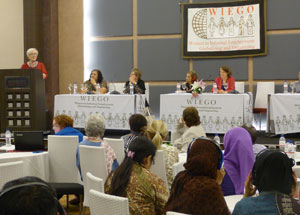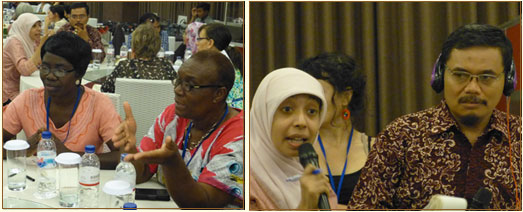 | | A newsletter covering the highlights and progress of the WIEGO Network in promoting secure informal livelihoods through policy interventions and stronger organizations. |
February 2015
WIEGO's General Assembly of Women Leaders in the Informal Economy
|
|
|
|
|
|
|
 |
 | |
The WIEGO Global Assembly brought together grassroots women leaders, activists, academics, government officials and leading researchers on the informal economy.
|
|
|
|
Leaders and supporters of organizations of informal workers from around the globe came together in Yogyakarta, Indonesia to celebrate recent achievements and chart the course ahead. The occasion was the 6th General Assembly of Women in Informal Employment: Globalizing and Organizing (WIEGO), held 11-13 November 2014.
 | | Throughout the General Assembly, simultaneous translation was provided in Bahasa Indonesian, English, French, and Spanish, and consecutive interpreting was done in Bulgarian, Hindi, Nepali, Portuguese and Thai. |
|
|
|
|
WIEGO's 6th General Assembly
|
|
|
WIEGO tracks news on the informal economy and informal workers from around the globe. | |
|
|
|
|
 | | Renana Jhabvala said, in her keynote address, "Each of us sitting here is a change agent." |
WIEGO's General Assembly, staged every four years, is an important opportunity for grassroots women leaders, activists, researchers and policymakers to share knowledge and generate new ideas. Renana Jhabvala, Chair of WIEGO's board and a founder of the organization, welcomed the 136 attendees-many of them women leaders in the informal economy representing over 25 associations, cooperatives and unions of informal workers from 39 countries on six continents. Renana spoke about WIEGO's beginnings. "Seventeen years ago, a small group of people realized that capital was globalizing, but workers were not," she said. "We thought there must be a voice for informal workers-a voice that offers ... clear messages."
In her keynote address, Renana talked about "organizers, shaping thoughts, shaping values, shaping visions and the future." Much of her address focused on change and how it can occur, and the important role of those who "burn for change"-the organizers in a community. "Each of us sitting here is a change agent," she said.  Listen to an excerpt of Renana's speech Listen to an excerpt of Renana's speech.  | | Clarisse Gnahoui (left) from Benin and Kofi Asamoah (not pictured) from Ghana have departed WIEGO's Board; Juliana Brown Afari (right) from Ghana was welcomed to the Board. |
In addition to offering a chance to highlight exciting facets of WIEGO's joint work, the General Assembly covered organizational business. Members' approved WIEGO's progress, plans and finances, welcomed new Board members, and acknowledged those stepping down. Follow the links to read about, listen to and watch highlights from WIEGO's 6th General Assembly here. |
|
Exhibitions Highlighting Collaborative Successes
 | | Carmen Roca, WIEGO's Regional Adviser for Latin America, explains how a Focal Cities approach has led to gains for informal workers in Lima, Peru. |
WIEGO kicked off its Global General Assembly by offering participants a guided tour of four areas in which it has turned collaboration with membership-based organizations into positive changes at the local level. Thematic exhibitions highlighted:
- the Informal Economy Monitoring Study
- the Law and Informality project
- Occupational Health and Safety for Informal Workers
- the Focal Cities approach undertaken in Accra and Lima.
Details and links to publications, audio and video are available here.
|
|
Women's Leadership and Economic Empowerment
 | | Madalena Duarte (left) and Sonia Dias described the Rethinking Gender in Recycling project and its impact. |
The 2014 General Assembly honoured women's leadership in organizations of informal workers around the world. A special session on Women's Leadership and Economic Empowerment provided a space for deeper examination and discussion of gender-specific issues in the informal economy. Melanie Samson, who chaired the special session, noted, "We are part of WIEGO because we are committed to improving the conditions, livelihoods and lives of all workers in the informal economy. And we are aware that in order to do that, we need to pay special attention to identifying and addressing the needs and interests of women workers." Two innovative WIEGO projects that focus on women's empowerment in the informal economy were presented. After project leaders detailed the aim, approach and progress of each, home-based workers from Kenya and Uganda and a member of a Brazilian waste picker cooperative shared how they and their organizations have changed through this work. See the presentations and hear from the participants here.
|
|
Policy Dialogue: Formalizing the Informal Economy
 | | In introducing the policy dialogue, Marty Chen, WIEGO's International Coordinator, said regulation must offer benefits to informal workers, not just bring costs. |
The 6th General Assembly concluded with a public policy dialogue that explored Formalizing the Informal Economy: Perspectives of Informal Workers. The event was attended by WIEGO members and guests from the government, Indonesian trade unions, journalists and others. Marty Chen, WIEGO's International Coordinator, opened the event. She noted, "To some observers, formalization means shifting all informal workers to formal jobs. But this is not a realistic goal. To others, formalization means regulating and taxing informal enterprises. But regulation should involve benefits, not just costs."  | | Audience members engaged in the discussion on formalization. |
Presenters from four sectors - domestic workers, home-based workers, street vendors and waste pickers - offered their perspectives on formalization. Read about the event.
|
Field Visits |
| | Apikri - Cloth Batik Makers |
On November 13, General Assembly participants left the Eastparc Hotel to see how the informal economy operates in Yogyakarta. Participants split into seven groups, and each travelled to a different location. Visitors met with producers of cloth and wood batik, shadow puppets and local food, visited a domestic workers' school, learned about traditional market porters and visited a recycling bank. Read more about the field visits. |
|
|
|
|